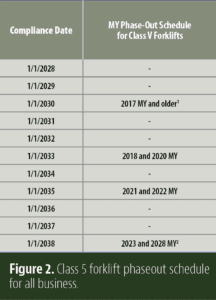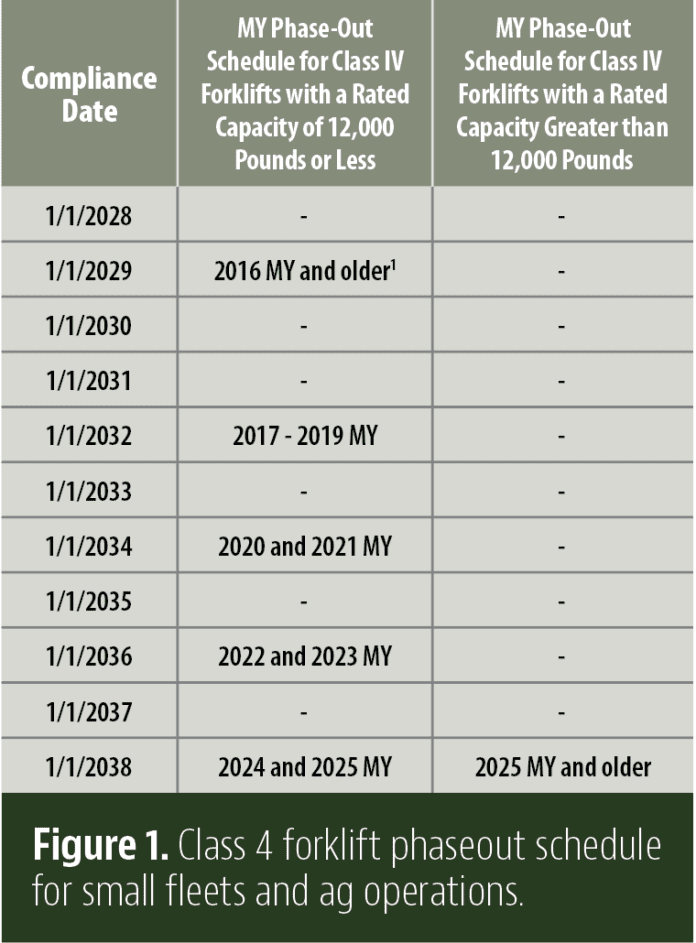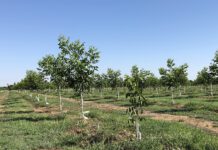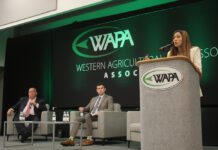In June, California Air Resources Board (CARB) adopted the Zero Emission Forklift Regulation to phase out the sale and use of propane forklifts in California by 2038. This regulation includes propane forklifts used in agricultural operations, such as tree nut hullers and processors. The regulation takes effect on Jan. 1, 2026. Starting in 2026, equipment dealers will be prohibited from producing or selling Class 4 or Class 5 propane forklifts with a lift capacity of less than 12,000 lbs., with a few exceptions.
Western Agricultural Processors Association (WAPA) led an ag coalition against yet another California regulation. Throughout the regulatory process, WAPA coordinated several meetings and onsite visits with CARB to emphasize impacts this rule will have on agricultural operations. During an infrastructure meeting with CARB, the California Public Utilities Commission, California Energy Commission, utility companies and other state agencies, the utility companies acknowledged systemwide constraints. As a result, infrastructure extensions were incorporated into the rule. We worked tirelessly to fight against this rule altogether, ultimately resulting in a regulation which recognized some key issues agriculture faces.
Unfortunately, California’s agenda to push for electrification across various equipment prevailed, and the regulation passed. This will significantly impact agricultural operations as many will need to upgrade their electrical infrastructure to support increased demand, along with the costs of charging stations, storage, and zero-emission forklifts. CARB stated that the phaseout schedule allows for gradual conversion. For agricultural operations, compliance will begin in 2029, after most other operations. The final draft includes a 25% cap on fleet phaseout for the first compliance year, but planning the conversion based on forklift model year will be critical.
Some key elements you should be aware of are exemptions, extensions, compliance dates, reporting requirements and required communications with your utility provider.

Exemptions
A couple of the exemptions to note for tree nut operations included rough-terrain forklifts, if the forklift has a permanently integrated telescoping boom as its primary work implement and if the forklift is a pellet jack. Based on the precedent set by the previous Large Spark Ignited (LSI) Rule, in-field forklifts used for agricultural operations in general are exempt. Specifically, forklifts used for more than 50% of the time in-field are not required to phase out propane forklifts. However, the usage hours must be documented yearly to maintain this in-field exemption.
Low-Use forklifts are exempted so long as the operation hours are under 200 hours per year and documented. The low use exemption sunsets on Dec. 31, 2030. A microbusiness may continue to operate a single forklift as a Low-Use forklift beyond the sunset date. A microbusiness means an operation with annual gross receipts of $5,000,000 or less over the previous three years, or is a manufacturer, as defined in subdivision (c) of Government Code Section 14837, as effective on Jan. 1, 2018, with 25 or fewer employees.
Extensions
Additional considerations were included given the states statewide infrastructure challenges, allowing for compliance extension for infrastructure delays or construction delays.
ZEV Forklift Delivery Delay
Operations experiencing difficulty acquiring due to supply chain challenges can receive up to a one-year-at-a-time extension delay. Extensions can continue to be renewed until the ZEF the fleet operator has ordered is received. Recognizing today’s economy, the extended timelines will be necessary to secure forklifts given the uncertainty of procuring in a specified timeframe.
Operations Delay
The technical infeasibility delay acknowledges that the allocated time frame of 2038 may not be adequate for technology to meet the demands or requirements of all operations types. The delay offers additional flexibility for businesses facing this particular circumstance. This extension can be renewed until a suitable ZEF model becomes available.
Infrastructure Delay
The infrastructure delay offers delays due to circumstances beyond the operation’s control on a project to install ZEF-related charging and fueling infrastructure. An extension granted will be valid for a period of up to two years per project. This extension cannot be renewed. Infrastructure can be related to permits, installation of charging or fueling infrastructure, construction of ZEF-related storage or shelter, and delays in the delivery of necessary building materials.
Electrical Infrastructure Delay
The current statewide electrical infrastructure shortfall we are facing poses a challenge to the state’s transition to ZEV forklifts. As a result, if your utility provider cannot provide the needed power for ZEV forklift conversion, an electrical infrastructure delay extension can apply. The initial extension will be granted for three years, followed by an additional two-year extension and a one-year extension as needed through 2038.
For any operation seeking an extension or exemption, you are required to label a forklift with an EIN label to each applicable forklift within 30 calendar days of receiving the EIN for such forklifts (CARB will assign a unique EIN to each forklift once reported.)
Reporting Requirement and Compliance Dates
General recordkeeping requirements such as company name, contact information, responsible official, forklift fleet manufactures, model year, rated capacity, etc. The initial report must be submitted by Sept. 20, 2026 and annually thereafter until full conversion over to ZEV forklifts.
Agricultural operations received additional time to comply and will begin phasing out Class 4 and Class 5 propane forklifts in 2029 and 2030 respectively. The schedule in Figure 1 is for agricultural operations and small fleets of Class 4 forklifts.
Communications with Utility Provider
The regulation requires early communication with utility providers regarding the expected demand and timeframe based on the phaseout schedule and the specific fleet at each operation. Operations must initiate this conversation by April 26, 2026.
In preparation for compliance with the new regulation, WAPA is developing guidance to assist our membership with the requirements and nuances of the rule. Additionally, a resolution was negotiated to review the rule in future years to determine if any changes are necessary.
While this is not a good rule, WAPA’s involvement led to one of the more workable rules as we received numerous concessions to alleviate some pressures. Our Association is also working to find and secure incentives for forklift and charging station upgrades.











